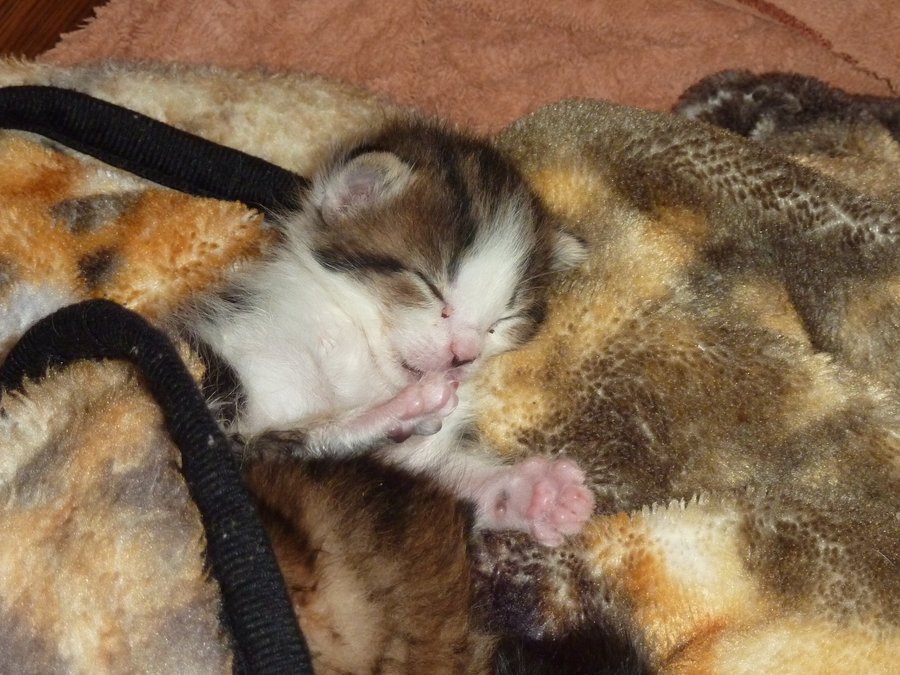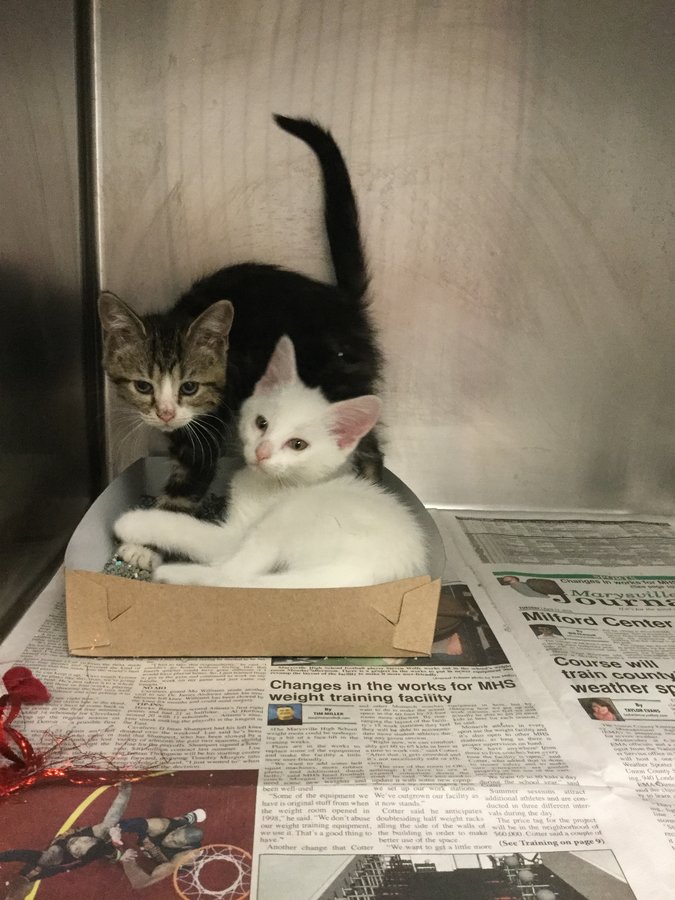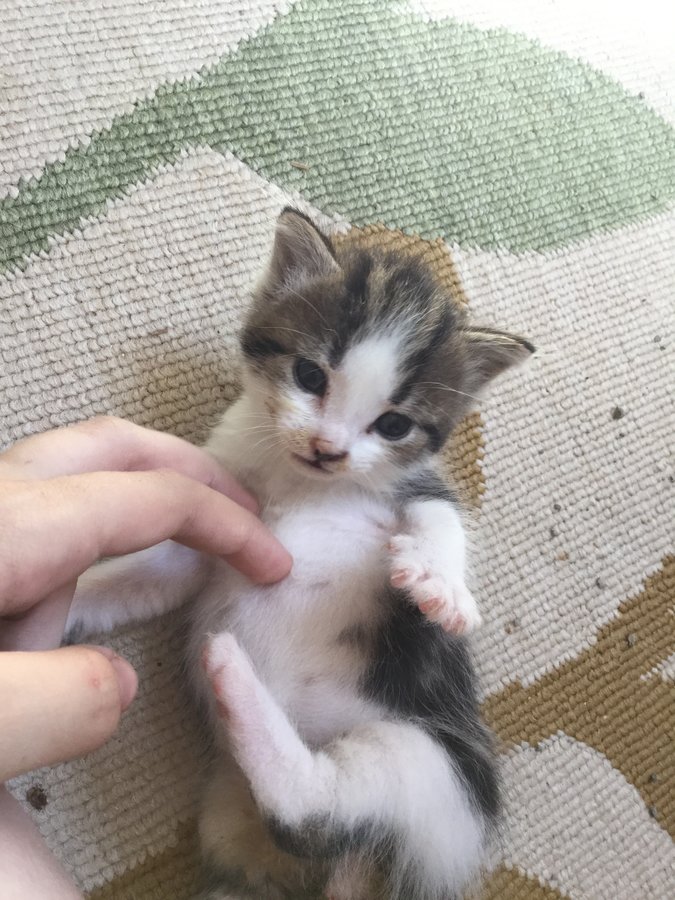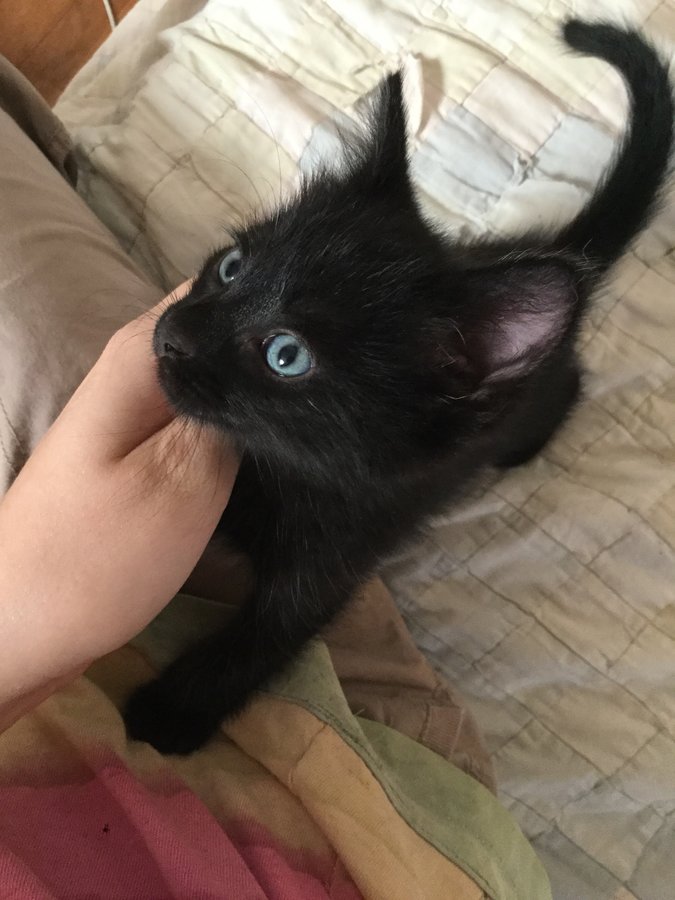I finally did something this year I've wanted to do for a long time; I signed up for the Foster Kitten program at our local humane society.
I wanted to start a place where people fostering kittens could share stories and pictures but also ask for and give advice to one another, as I know there are plenty of others fostering kittens or mother cats and their litters for the first time.
The first thing I learned about bottle-feeding five kittens at the same time is that they demand a lot more attention then I thought they would. Day or night they insist on eating every 2-6 hours (depending on age or how much they ate last meal) and they'll let you know either by trying to nurse on one another or crying.
However, while being woken in the middle of the night isn't exactly fun, having adorable little dependent babies and seeing them grow healthy, happy, friendly and strong makes it all worth it.
I'll start with my five kittens. They were brought to the shelter at around two weeks of age (estimated birth date June 1). They had lost their mother but the people who had them gave them a bottle and helped them out for a day before bringing them to us. The shelter didn't have room to take in any more animals, but I had just finished my paperwork to foster there and so I took them and that's when it all started.
Kai, Cash, Trouble, Ollie, and Bee are now five weeks old and were wormed a few days ago for the first time. They're very, very playful and demand time out to run around my room multiple times a day (and sometimes during the night too). They use the litterbox on their own but haven't grasped the concept of eating from a dish yet. They prefer their bottle, though will drink milk mixed with wet kitten food from it as well as plain KMR.
When they first arrived they were estimated at 2-2.5 weeks of age because of how developed they were. They were crawling and had just opened their eyes but their ears remained down and they were unable to use the bathroom on their own or to really see all that well. For a few years now I have used a sideways desk as a brooder for chicks that I raised in my room and because it was free of any animals at the time I decided it would make a perfect nest for a litter of kittens. It was their den, their safe spot. It prevented them from getting cold, wet, scared, or lost. I lined the floor with towels for absorption, traction and soft texture and made their main nest out of a soft blanket that was difficult to get claws stuck in. The blanket kept them comfortable and warm and held their smell on it so they could always find it again.
Here in this picture you can see Cash snuggled up inside their blanket. Cash is a Brown classic tabby and white with a white spot on his back and a larger blaze then his sister, who is a similar color. He is independent minded for having been the runt for a couple weeks, always willing to tackle his larger siblings or wander off on an adventure.
The kittens mostly slept, ate and used the bathroom, as they do at this age. I would wake them up (or they would wake me up) feed each of them until they seemed disinterested in the bottle and then stimulate them to go (sometimes I would do so before feeding them, if I thought they really had to). I would spend some time cuddling them, holding them, petting them and lying down next to them like their mother would. When I left it was like their mother going off hunting and they would curl up and go to sleep. If they continued to mew I would cover them with the blanket so they felt more secure and like they were in a den, and so they were warmer too.
This, again, is Cash. He had to get a rinse when he got a messy behind, but no real baths were necessary. All the kittens needed a rinse at some point because I was not willing to lick the like a mother cat would. : )
When the towel or blanket would get dirty or smelly I would replace it with a new one, which quickly regained a familiar scent to them. They would crawl around beside me, mewing and trying to climb up closer to my face while I took turns feeding each one. When I laid down next to them in the box they would always nose me and mew extra loud, trying to find milk, so the only way to get them to sleep was to leave. Unlike our first orphan kitten we raised, Nym, being kept in a group meant if one was awake they all tended to be.
The two black kittens, Trouble and Kai, are difficult to tell apart unless you look at their tummies. Kai has a small white spot where his bellybutton would be. He is also the smaller of the two, though when we first got them he was actually larger.
For a while Cash was the runt. He was one of the largest when we first got him but then he seemed to have trouble with latching onto the nipple and would chew at it or lick it. He also got the bloat for a little while before I realized the kittens needed burped. Burping young kittens is very important because bottle feeding means they will get more air inside of them then they would naturally with a mother cat and this can cause stomach upset and other issues. Over-feeding can also cause issues with runny droppings and stomach upset.
To prevent them eating too much I would let them drink until they released, then set them down and do the rest of the kittens, then give them all a second, small helping to make sure they were full and ready to go to sleep. They also tended to like a little snack after being stimulated to use the bathroom, as this was not always a fun process in their opinion (or mine) and could stress them out.
Again, this is Cash. He seemed to sit still the best for pictures.
As they got older the kittens began arguing over the bottle and their claws became very sharp and uncomfortable (to say the least). It was to the point where I dreaded spending time with the kittens, as the summer heat meant I didn't want to wear long-sleeves and pants but their little claws were leaving dozens of tiny little scratches on my neck, face, hands, arms, legs and feet. I had to put up with it, like a mother cat does with youngsters. They weren't yet old enough to know what scolding would mean, and besides, if I had had fur it wouldn't have mattered.
A towel on my lap or long pants were the best answer as far as preventing scratches on my legs. I would hold the kitten being fed up above the others. You can also simply take them out of the box, but a mother cat remains with the litter while feeding them, letting them remember her scent and nuzzle into her fur (or lack their of in my case). : )
Again, Cash, perched on my knees to get out of reach of the other kittens. While a kitten naturally feeds on its belly, to get them to latch onto the nipple I would generally have to hold them at a slant, letting them rest their paws on my hand like their would their mother's stomach and supporting them with the other hand wrapped around them or on their belly.
The first day they came home they were so tiny! I tried weighing them with a food scale, but when they wouldn't sit still it made it wobble and the weight fluctuated. However, with so few kittens it is pretty easy to keep track of which ones look like they are growing and which ones have empty stomachs or prominent ribs.
Nestled into their "nest" these are the two remaining kittens, Oliver (Ollie) and Bee. Oliver is a brown mackeral tabby while Bee is a brown mackeral tabby and white. Oliver is the type to be slightly delicate personality wise. He is quick to react to loud sounds, enjoys sitting in corners just to observe (we call them contemplation corners) and likes to be petted as much as played with. Bee is the super sweet, snuggely little playful queen of the world. As the only girl in the litter, she knows she rules. She is full of energy, and the first to use the litter box on her own, groom herself, and show play behavior. She loves to try new things, but also adores just sitting with you and purring while she gets petted or having her tummy tickled while she kicks her little feet.
I'd love for others to share their stories and tips too. The more I learn about how to work with foster kittens the better I can help the shelter this Kitten Season.
: )
I wanted to start a place where people fostering kittens could share stories and pictures but also ask for and give advice to one another, as I know there are plenty of others fostering kittens or mother cats and their litters for the first time.
The first thing I learned about bottle-feeding five kittens at the same time is that they demand a lot more attention then I thought they would. Day or night they insist on eating every 2-6 hours (depending on age or how much they ate last meal) and they'll let you know either by trying to nurse on one another or crying.
However, while being woken in the middle of the night isn't exactly fun, having adorable little dependent babies and seeing them grow healthy, happy, friendly and strong makes it all worth it.
I'll start with my five kittens. They were brought to the shelter at around two weeks of age (estimated birth date June 1). They had lost their mother but the people who had them gave them a bottle and helped them out for a day before bringing them to us. The shelter didn't have room to take in any more animals, but I had just finished my paperwork to foster there and so I took them and that's when it all started.
Kai, Cash, Trouble, Ollie, and Bee are now five weeks old and were wormed a few days ago for the first time. They're very, very playful and demand time out to run around my room multiple times a day (and sometimes during the night too). They use the litterbox on their own but haven't grasped the concept of eating from a dish yet. They prefer their bottle, though will drink milk mixed with wet kitten food from it as well as plain KMR.
When they first arrived they were estimated at 2-2.5 weeks of age because of how developed they were. They were crawling and had just opened their eyes but their ears remained down and they were unable to use the bathroom on their own or to really see all that well. For a few years now I have used a sideways desk as a brooder for chicks that I raised in my room and because it was free of any animals at the time I decided it would make a perfect nest for a litter of kittens. It was their den, their safe spot. It prevented them from getting cold, wet, scared, or lost. I lined the floor with towels for absorption, traction and soft texture and made their main nest out of a soft blanket that was difficult to get claws stuck in. The blanket kept them comfortable and warm and held their smell on it so they could always find it again.
Here in this picture you can see Cash snuggled up inside their blanket. Cash is a Brown classic tabby and white with a white spot on his back and a larger blaze then his sister, who is a similar color. He is independent minded for having been the runt for a couple weeks, always willing to tackle his larger siblings or wander off on an adventure.
The kittens mostly slept, ate and used the bathroom, as they do at this age. I would wake them up (or they would wake me up) feed each of them until they seemed disinterested in the bottle and then stimulate them to go (sometimes I would do so before feeding them, if I thought they really had to). I would spend some time cuddling them, holding them, petting them and lying down next to them like their mother would. When I left it was like their mother going off hunting and they would curl up and go to sleep. If they continued to mew I would cover them with the blanket so they felt more secure and like they were in a den, and so they were warmer too.
This, again, is Cash. He had to get a rinse when he got a messy behind, but no real baths were necessary. All the kittens needed a rinse at some point because I was not willing to lick the like a mother cat would. : )
When the towel or blanket would get dirty or smelly I would replace it with a new one, which quickly regained a familiar scent to them. They would crawl around beside me, mewing and trying to climb up closer to my face while I took turns feeding each one. When I laid down next to them in the box they would always nose me and mew extra loud, trying to find milk, so the only way to get them to sleep was to leave. Unlike our first orphan kitten we raised, Nym, being kept in a group meant if one was awake they all tended to be.
The two black kittens, Trouble and Kai, are difficult to tell apart unless you look at their tummies. Kai has a small white spot where his bellybutton would be. He is also the smaller of the two, though when we first got them he was actually larger.
For a while Cash was the runt. He was one of the largest when we first got him but then he seemed to have trouble with latching onto the nipple and would chew at it or lick it. He also got the bloat for a little while before I realized the kittens needed burped. Burping young kittens is very important because bottle feeding means they will get more air inside of them then they would naturally with a mother cat and this can cause stomach upset and other issues. Over-feeding can also cause issues with runny droppings and stomach upset.
To prevent them eating too much I would let them drink until they released, then set them down and do the rest of the kittens, then give them all a second, small helping to make sure they were full and ready to go to sleep. They also tended to like a little snack after being stimulated to use the bathroom, as this was not always a fun process in their opinion (or mine) and could stress them out.
Again, this is Cash. He seemed to sit still the best for pictures.
As they got older the kittens began arguing over the bottle and their claws became very sharp and uncomfortable (to say the least). It was to the point where I dreaded spending time with the kittens, as the summer heat meant I didn't want to wear long-sleeves and pants but their little claws were leaving dozens of tiny little scratches on my neck, face, hands, arms, legs and feet. I had to put up with it, like a mother cat does with youngsters. They weren't yet old enough to know what scolding would mean, and besides, if I had had fur it wouldn't have mattered.
A towel on my lap or long pants were the best answer as far as preventing scratches on my legs. I would hold the kitten being fed up above the others. You can also simply take them out of the box, but a mother cat remains with the litter while feeding them, letting them remember her scent and nuzzle into her fur (or lack their of in my case). : )
Again, Cash, perched on my knees to get out of reach of the other kittens. While a kitten naturally feeds on its belly, to get them to latch onto the nipple I would generally have to hold them at a slant, letting them rest their paws on my hand like their would their mother's stomach and supporting them with the other hand wrapped around them or on their belly.
The first day they came home they were so tiny! I tried weighing them with a food scale, but when they wouldn't sit still it made it wobble and the weight fluctuated. However, with so few kittens it is pretty easy to keep track of which ones look like they are growing and which ones have empty stomachs or prominent ribs.
Nestled into their "nest" these are the two remaining kittens, Oliver (Ollie) and Bee. Oliver is a brown mackeral tabby while Bee is a brown mackeral tabby and white. Oliver is the type to be slightly delicate personality wise. He is quick to react to loud sounds, enjoys sitting in corners just to observe (we call them contemplation corners) and likes to be petted as much as played with. Bee is the super sweet, snuggely little playful queen of the world. As the only girl in the litter, she knows she rules. She is full of energy, and the first to use the litter box on her own, groom herself, and show play behavior. She loves to try new things, but also adores just sitting with you and purring while she gets petted or having her tummy tickled while she kicks her little feet.
I'd love for others to share their stories and tips too. The more I learn about how to work with foster kittens the better I can help the shelter this Kitten Season.
: )






























